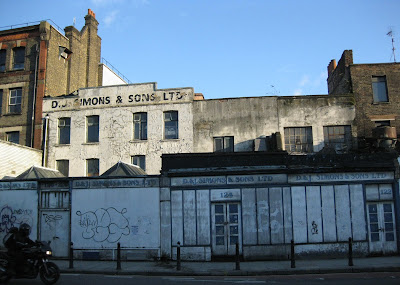

Remember that we can never know by the organs of sight the time of day, our dilating pupils compensate unnoticed lack of light. So we were told on day one of a camera course which our then employer had been kind enough to fund - or disappointed enough enough with site records. Hence, explained the trainer, we have the International Organisation for Standardisation.
On day two a job came up, a little window opening in the form of the foundation of an office block that, if we did not get in there immediately, would close again before we had recorded what was there. The content of day two will forever remain a mystery.
However, as I looked across Hackney Road at D.J. Simmons and Sons as was, or, indeed, D.&.J. Simmons, depending whether you looked up at the light or down at the dark, I wondered. Perhaps one never knew, but perhaps there never was one to know - no single time of day.


The foundation was of a Hobb’s Lane office block to be. The find there had been of woman’s head and shoulders in hard, shining black stone, dug up by a site worker with a conscience, it seems, since by the time we got there he had been sacked for letting on. Our presence thanks to his call risked holding up work potentially for weeks.
It was the ancient Egyptians that gave us the sixty-second minute, the sixty-minute hour. But in the early days, their units changed length according to the time of year. Had the Egyptians been as great travellers as they were builders, they would have discovered that the change should depend on place, as well, an equatorial minute shorter in summer, longer in winter, than a minute heading north for the pole.
Had they come to England, for instance, where they might have left the head and shoulders of a beautiful woman to be buried over time. As it was, the find proved of much interest, though how it had got there from Sydenham nobody could say. Though there are records of the Crystal Palace Egypt experience , they are at best vague, and and this very good reproduction in basalt of Cleopatra was indeed a rare find, and its interest was no doubt undiminished for Palace enthusiasts for the basalt’s being Siberian or the features a very good rendition of Isabella Glyn’s as she had appeared to such acclaim at Sadler’s Wells.
The arrival of standardisation already occurred in the later Egyptian dynasties and, and the immediate effect was to drive the differing minutes underground. The ISO reading, though, as it is a standard, can be used to uncover what is not. Turning it up allows aperture speed to descend, and to depths where only the slowest go.


It was once having stopped the digs that it occurred to me, that I had time, in fact, to try this, and what I discovered is that the length of the unit of time depends not only on place, but on person, as well. There is a people amongst us in the city who function, who remain lucid, who exist at a speed far below that of the others; another who live faster, who at slow speeds become blurred, a people of ghosts to the others, broken, passing as faded fragments, relics of another time.


When we first met I believe that, intuitively, both of us knew this, she on her side of the room, I on mine. But as with so much unconscious, the danger was that it would vanish, as it did. I recall it as a time of the purest excitement, though there is no recollection that is not vague. A man leant towards her to be heard over the din. She may have listened, but unabsorbed, looked past him at nothing present, past the dancing, laughing, drinking, smoking. Somewhere in South London, it may have been a club or a pub, more probably a squat, the walls in my recollection grey. We were both young, and I had at first taken her for a student like I.
At some point our eyes met. My friends were nearby, also students of archaeology, most of them, just as happy as I to forget it all for a night, to sacrifice, as we liked to put it still unconsciously conscientious, an evening on the altar of the present.
I would not at the time be able to say what, but something in that look told me that she could not be a student like I, and, more disquietingly, that nor could I, that my adoption of the role was somehow fraudulent.
I said, I think, that these times were full of a great sense of possibility. If I felt a twinge of chastening, of having been rumbled, it was a positive feeling, a feeling of having been drawn out of myself to some state somehow of election, that we had picked each other out across the crowd for some shared but nebulous purpose involving desire, certainly, but with it also other things that only time would reveal.
Whatever it was that that might have been, what it is that it was, never preoccupied me at the time or for the ensuing weeks, beyond the excitement itself it would have seemed contradictory to seek below the surface for messages in stifled whimpers and abandoned cries, significance in sweat on crumpled sheets.
And then, only now that I have emerged from all the period in between, I look back and recognize in that moment intimations of what is happening now, realise that the digs had been distractions, that their ces
sation would be responsible for these spirits’ now rising everywhere overground.




No comments:
Post a Comment